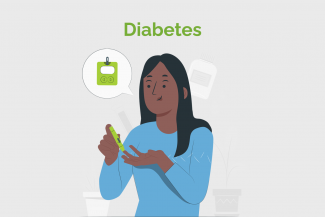
There are different types and stages of diabetes
Prediabetes: is when your blood glucose levels are higher than normal but not high enough to be diabetes. Simply put, prediabetes puts you at risk of developing diabetes unless you change your lifestyle and bring down the amount of glucose in your blood. According to the Centers for Disease Control and Prevention (CDC), 15 to 30 per cent of prediabetics develop Type 2 Diabetes within five years if they do not change their lifestyle. But just because you have prediabetes does not mean you will automatically develop diabetes. By altering your diet and by exercising, you can prevent it or delay its onset. Read more
Type 1 Diabetes: is usually diagnosed in childhood or adolescence. This is a chronic condition in which the body produces little or no insulin. This type of diabetes accounts for about 5% of all diagnosed diabetic cases. Risk factors for Type 1 diabetes are auto-immune, genetic or environmental.
Auto-immune disease is when the body's immune system fights disease and attacks a part of the body. In some cases of Type 1 diabetes, the immune system attacks the insulin-producing beta cells in the pancreas and destroys them. Therefore, the pancreas produces little or no insulin.
Unlike Type 2 diabetes, this is not a preventable disease. Patients with Type 1 diabetes are dependent on insulin shots to survive. If left untreated, such patients can lapse into a life-threatening diabetic coma known as Diabetic Ketoacidosis.
Type 2 Diabetes: is the more common form of diabetes, accounting for about 95% of those diagnosed. It can also be prevented, delayed and managed. In Type 2 diabetes, the pancreas produces insulin but, for unknown reasons, the body cannot effectively use it. This condition is called Insulin Resistance. After a couple of years, insulin production also decreases thereby increasing glucose levels, which is harmful to the body.
You may or may not have symptoms. The good news is that studies show that a healthy diet, regular physical activity and medication, (if prescribed), can help maintain healthy blood glucose levels, control complications that are associated with diabetes and can even delay or prevent the onset of Type 2 diabetes.
Gestational Diabetes: Two to ten per cent of pregnant women develop diabetes during pregnancy. This is called gestational diabetes. This causes health problems for both the mother and the child during the pregnancy and after. Women with gestational diabetes have 20 to 50 per cent chance of developing Type 2 diabetes in the next five to 10 years. The child, too, may suffer from obesity and develop Type 2 diabetes. Understand how to manage Gestational Diabetes

















